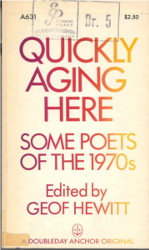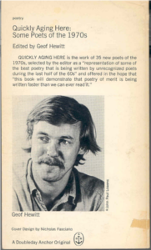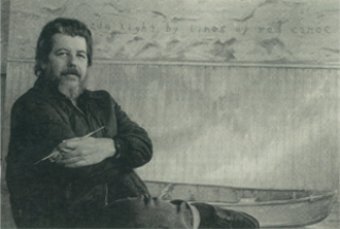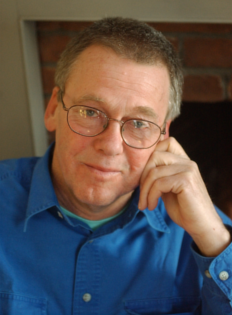Fall 2008
Table of Contents - Vol. IV, No. 3
Poetry Translations Fiction Essays
Christopher T. George
with reminiscences by Editor Geof Hewitt
Quickly Aging Here Retrospective: Geof Hewitt, Joe Cardarelli, and a Poetry Anthology that Originated in Baltimore


Forty years ago, an anthology appeared that featured thirty-five mostly unknown, young, up-and-coming poets. Quickly Aging Here: Some of the Poets of the 1970's edited by Geof Hewitt (New York: Doubleday Anchor, 1969) was arguably one of the most influential poetry collections of its era. Poets in the anthology who have become nationally recognized are Coleman Barks, William Harmon, Alfred Starr Hamilton, Shirley Kaufman, Gregory Orr, Stan Rice, Mary Ellen Solt, and Sandford Lyne—the subject of a recent retrospective here at Loch Raven Review. Baltimore poet David Hilton’s widely republished “The Poet Tries to Turn in His Jock” is one of the better known poems in the book:
The Poet Tries to Turn in His JockGoing up for the jump shot
Giving the kid the head-fakes and all
‘Til he’s jocked right out the door of the gym
And I’m free at the top with the ball and my touch,
Lofting the arc off my fingertips,
I feel my left calf turn to stone
And my ankle warp inward to form when I land
A neat right angle with my leg,
And I’m on the floor,
A pile of sweat and sick muscles,
Saying,
Hilton,
You’re 29, getting fat,
Can’t drive to your right anymore,
You can think of better things to do
On Saturday afternoons than be a chump
For a bunch of sophomore third-stringers;
Join the Y, steam and martinis and muscletone.
But, damn,
The shot goes in.
A case can be made that Quickly Aging Here originated in Baltimore out of the friendship between the late Joe Cardarelli (1944–1994) and editor Geof Hewitt. The passing of Cardarelli has been bitterly felt among the literati of Baltimore, because he was a significant figure in the Baltimore arts scene. During his twenty-five year career as writing instructor and writing program director at the Maryland College of Art (MICA), he brought to Baltimore such major poets as Allen Ginsberg and Lawrence Ferlinghetti. Cardarelli’s influence was discussed in an essay on the Baltimore literary scene by Dave Eberhardt and Dan Cuddy in our Winter 2007 issue.
I asked Geof Hewitt to reflect back forty years to the origins of Quickly Aging Here.
Geof commented, “Joe was a terrific force with his gentle humor and his energetic support of all poets. He was also a close friend during my year in Baltimore and for several years thereafter.
"Joe and I met in the fall of 1966 as newly registered students in the Writing Seminars at Johns Hopkins, taught by the eminent poet Elliott Coleman. We became close friends: Joe and his wife Cathy Teague understood my loneliness and made me feel welcome at meals and on day trips. After seminars we sometimes smoked a bowl and discussed the issues of the day. I heard the Beatles’ Sergeant Pepper album on the day of its release in Joe’s apartment. My eyes welled as I knew, just knew, that I’d already had this music in me all my twenty-two years. I still believe that.
"Joe and I dreamed up fantastic schemes and probably acted as brakes on each other when one of us started to script a fantasy into reality. One that we failed to stop, a true joint venture, occurred when Elco (our secret nickname for Mr. Coleman) asked the two of us, a week in advance of some out of town obligation he had to honor, to lead the poetry writing seminar in his absence. Joe and I determined that we’d do the completely egoless thing as 'teachers' of this twenty-member class. We hauled a television into the basement-level seminar room of Eisenhower Library, set it at Mr. Coleman’s place on the seminar table fifteen minutes ahead of class, plugged it in, and when everyone had arrived, without speaking we turned it on. The television happened to receive nothing but snow and static, even though we’d thoughtfully brought along a set of rabbit ears. The volume was adequate and quite annoying. I think we maintained beatific smiles throughout the class, refusing to speak, refusing to answer questions. Some of our classmates finally began to walk out. Joni Raffeld was in tears, but she lasted most of the seminar. A couple of stalwarts got the joke, whatever it was, and stayed with us the whole two hours.
"We were probably satisfied if somewhat embarrassed in the weeks afterward; Mr. Coleman asked us how our class had gone, we reported our stunt, and I think he scratched his chin and whispered, 'So I’ve heard. Marvelous!' (He used 'marvelous' often enough as a spontaneous response to students’ comments in class that we understood it to have a variety of possible meanings.) These were playful times in general; campus realization of Vietnam was still a year on the horizon. The Beatles were speaking for us all. Woodstock was less than two years in the future.
"By the time Woodstock came I was heading into my second year at the University of Iowa Writers’ Workshop; Joe was still in Baltimore, teaching at the Maryland Institute of Art. We exchanged frequent letters and shared a few holidays, either in Iowa City or Baltimore or Vermont, where I had bought an old farmhouse and some land. We shared a wacky, imaginative spirit and the post-adolescent ambition of eager young poets. Mike Kinney, a pal of mine from undergraduate days, stopped in Iowa City, representing Doubleday books in bookstores and canvassing the University faculty for books in progress. One night at The Mill, with drunken bravado I unveiled for him the concept of a cheap paperback of emerging poets. 'Unknowns until people read their poems!' is how I climaxed my pitch.
"Kinney took me seriously and three weeks later I received a contract and introductory letter, a complete surprise, from Pyke Johnson, Jr., a senior editor, a grown man for Pete’s sake, whose office in New York I then visited during spring break. I set ground rules for the editing, solicited a handful of editors for names of poets who had never published a book, and mailed each nominee a form letter, inviting submissions. Of course I contributed at least a dozen names myself: on my list Joe was second only to Alfred Starr Hamilton, who at fifty-five became the oldest poet in the anthology, published in 1969: Quickly Aging Here: Some Poets of the 1970’s.
"Thirty-five poets no one had heard of and The New York Times reviewed the book favorably! College teachers across the country adopted the book and, as collections of contemporary poems go, sales were brisk.
"I look at this anthology now, almost forty years later. I still love Joe’s entry from 'The Marlborough Poems.' The others touch me only in certain lines, but hell, I have similar misgivings about most of the other poems in the book.
"Was I making some of these selections with the spirit of lugging a television to the basement of Eisenhower? Would today’s reader admire the same poems, like Joe’s from 'The Marlborough Poems,' that I still think are among the best such work of that time?”
Here is an excerpt from Joe Cardarelli’s “The Marlborough Poems” cited by the editor as one of the better pieces in the collection. The poet’s reverie on an apartment building where he once resided remains haunting, relying as it does on the word sound similarity between the names “Marlborough” and “Rose” and the assonance of words such as “know,” “glow,” “old,” “ghosts,” and “sorrow.” As with other works by this poet, the piece is deceptively straightforward but nonetheless crafted.
the Marlborough
Do you know the Marlborough
Rose
Rose
I see myself in rooms
with creatures who think
they are strange
One room shows
a fur coat, gloves
& boots of spotted tiger
a sword, candles & cutting table
Please take care
of those ancestors
who glow with sorrow
One room is hung with my bones
Old ladies walk close halls
that leak rain the wind blows
Rose do you know
My rooms in The Marlborough
Rose ghosts who
float in loose robes
inhabit The Marlborough
Rose
Cardarelli’s self-written bio at the back of the book is also pertinent. It is itself poetic and self-revealing—redolent of the age in which it was written. Here is an excerpt:

Joe Cardarelli
Joe Cardarelli never subsequently left Baltimore. He continued to teach at MICA until his death in 1994, and literature in Baltimore is much the better because he did so.
© Christopher T. George, Geof Hewitt, David Hilton, The Estate of Joseph Cardarelli

